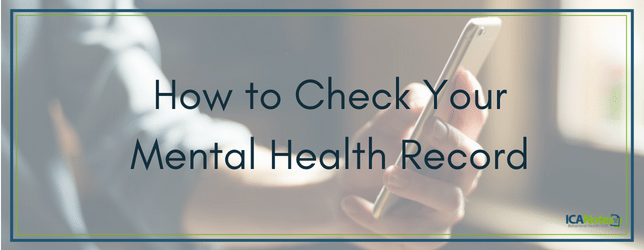See Renewal 101 for more concepts. Keep alcohol usage to a minimum and avoid other drugs. Sometimes people use alcohol and other drugs to "self-medicate" however in reality, alcohol and other drugs only exacerbate problems. To find out more, see Alcohol and Other Drugs. Looking for help signifies strength not a weakness.

People who get appropriate care can recover from mental health problem and addiction and lead complete, rewarding lives. See Resources for Tension and Mental Health for school and community resources. * Adapted from the National Mental Health Association/National Council for Neighborhood Behavioral Health Care.
It can be very tough and heart-wrenching to see an enjoyed one having problem with symptoms of mental disorder. And typically it can be hard to understand how to finest help and support your liked one. Every individual is various and situations differ considerably. The person might have a specific medical diagnosis, or you might simply have concerns about the way an individual has actually been talking and behaving.
However, below are a couple of pointers and things to think about when you are trying to help a liked one. For instance, withdrawal from social interaction, uncommon problems functioning at school, work or social activities or dramatic changes in sleep and cravings are possible signs. See more on Caution Indications of Psychological Disease.
But following up with an evaluation from a doctor could assist deal with any problems and avoid more serious symptoms from developing. Among the hardest and crucial steps may be just starting the discussion (what is mental health stigma). You do not need to be an expert or to have the responses. Express your concern and determination to listen and be there for the individual.
Reassure them that you appreciate them and are there for them. Usage "I" statements. For instance, use "I am fretted about you," "I would like you to think about talking with a counselor." instead of "You are." or "You should." Attempt to reveal patience and caring and try not to be judgmental of their thoughts and actions.
How Why Can't I Cry Anymore Mental Health can Save You Time, Stress, and Money.
Encourage them to talk with a psychological health care service provider or with their medical care service provider if that would be more comfy for them. For some people, it might be handy to compare the situation to a physical health concerns and how they would react. For example, if there was a concern about Substance Abuse Treatment diabetes or high blood pressure would they be most likely to look for treatment? Advise them that seeking assistance is an indication of strength.
The more you understand about conditions, symptoms, possible treatments and what to anticipate, the better you will have the ability to support your enjoyed one. However, thoroughly think about sources of information online. Just like any topic, the quality of details offered online varies a great deal. (See resource list listed below.) Try to anticipate and help deal with any prospective barriers to the person seeking help.
For instance, make it easier for the individual by researching potential therapists, hours, areas and insurance related problems. If you believe they might be barriers, address possible issues with transport, child care, techniques for interacting with a company, and so on. While you're focusing on helping your enjoyed one, it's also essential to look after yourself physically and emotionally.
Acknowledge and acknowledge the limitations of what you can offer. Blogger Victoria Maxwell composes: "When my mother was ill with the swings of severe anxiety, mania, and anxiety, I was fretted in addition to upset. I required somebody outside the family to easily discuss my aggravations and injured without the worry of disturbing her.

NAMI uses both a training program for families (Family to-Family) and continuous peer-led support system for relative. NAMI Family-to-Family is a totally free, 12-session educational program for friends and family of people dealing with mental disorder. It is an evidenced-based program taught by NAMI-trained family members who have been there.
NAMI Family Support Group is a peer-led assistance group for member of the family, caregivers and liked ones of individuals living with psychological illness. They are free and confidential. Find a NAMI Household Support Group near you here. It is necessary to have realistic expectations. Recovery is generally not a straight-forward procedure, there will be likely be enhancements and setbacks along the way.
Some Known Details About Who Can Bill Medicare For Mental Health Services
Even if you feel your assistance and actions are not making a distinction, they are most likely making a difference for your buddy or family member. You enjoyed one might be injuring and not plainly acknowledge what you're doing or may not be able to express gratitude. However knowing you are there for them can be important in assisting their healing.
Simms, K. "Tips for Helping a Loved One Look For Mental Healthcare, From the Individual Who Helped Me." The Mighty.com.
If you think that you, or somebody you're close to, might have mental health problems, you have actually already taken the initial step, which is to see that something does not appear right. For example, somebody may appear depressed, nervous, see or hear things that aren't there, abuse drugs, or have other issues with thinking.
However when you do, you can discover what's going on and start to improve. The earlier you do it, the much better. Like numerous other medical conditions, mental disorders are typically simplest to deal with when https://www.google.com/maps/d/drive?state=%7B%22ids%22%3A%5B%2213BwB7GlMDIpGzr4BVZcrroDs_d-SZ6wR%22%5D%2C%22action%22%3A%22open%22%2C%22userId%22%3A%22113462927036240720607%22%7D&usp=sharing they're in the early phases. If it's an emergency situation-- for circumstances, somebody is suicidal or in a crisis-- call 911. If it's not an emergency, start with your routine doctor.
If you are physically fine, he will likely refer you to a mental health care expert-- someone trained in treating psychological health. If you have health insurance, learn what your strategy covers. how to become a mental health advocate. Your company might provide an "Staff member Assistance Strategy" (EAP) that uses therapy, too. If you are a veteran, the VA system also has resources.
They are often called general practionioners. Doctor assistant (PA): These caretakers are not medical professionals, but they are trained to identify signs of mental illness and to treat mental illness under a medical professional's supervision. Nurse professional: These registered nurses (Registered nurses) have extra training, including some background in dealing with psychiatric problems. Psychiatrist: These are medical doctors (MDs) who focus on the diagnosis and treatment of mental disorders.
Get This Report about How To Improve My Mental Health
They are likewise trained in psychiatric therapy, a kind of counseling or "talk therapy." Psychologist: These professionals aren't MDs, however they have advanced degrees in psychology (PhD or PsyD). They are trained in therapy, psychotherapy, and psychological screening. They can not prescribe drugs to treat mental disorders other than in particular states. Social worker: These professionals can offer counseling services and social service requirements.
Psychiatric nurse professional: These are registered nurses (Registered nurses) who specialize in treating mental or psychiatric diseases. You will wish to deal with someone you feel comfortable talking with. What you state is confidential unless someone's safety is at stake or unless a court order is included (how much does mental health counselors make).
As the number of people detected with psychological health problems such as anxiety rises to brand-new highs, the requirement for medical services to treat them is growing too. Roughly 56 percent of American adults with a mental illness do not get treatment. There's also evidence of an alarming absence of treatment amongst teens, with the CDC reporting that the suicide rate for teenagers is increasing.